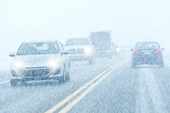
5 common bad driving habits to break in the new year
2021 for many is a new year and a new start. As a part of that, many are making new year's resolutions, but amongst the common promises of less screen time and fewer salty snacks, have you considered making a new year's resolution regarding your driving? All of us have picked up bad driving habits over the years, but what we don't often realise is that they can actually damage our cars. Here are some common bad driving habits for you to think about resolving to stop, to both improve your driving and your car's overall condition.
1. Revving the engine from cold
Starting your car from cold can sometimes be a difficult process, as engines really don't like cold temperatures. Everything from your battery holding less of a charge to fluids within the engine getting thicker becomes an issue. But just because your engine has started on a frosty new year's morning, it doesn't mean you're safe to rev it. Actually, the complete opposite is true. Your engine needs time to warm up, for all of the fluids to warm up and flow freely again, and for every part of the engine to become properly lubricated. Revving your engine excessively while it's still cold can potentially cause damage. A good rule of thumb is to keep revs under 3,000 for petrol cars and 2,000 for diesel cars as much as possible until your temperature gauge has risen halfway.
2. Riding the clutch
Riding the clutch is a thing many drivers do who own manual cars. Riding the clutch is the process of holding the car on the bite point for longer than necessary. This is often done during hill starts or when waiting at traffic lights or junctions that happen to be on an incline. The issue is, however, that this can cause considerably premature wear to your clutch pressure plate. You should only hold your clutch on the biting point as long as it takes to get your car moving. When you change gear, depress the clutch, then take your foot off it completely once you have let it back out. This will prolong the life of your clutch.
3. Taking speedbumps and potholes too fast
Speedbumps are becoming an increasing aspect of everyday driving, as more and more streets now feature speed restrictions. While many drivers find them annoying, the power of annoyance alone is not enough to make them go away. That means you need to stay very aware of potential speed restrictions on the road. Crashing over them too hard can cause damage to your steering and suspension. It's not always possible to see them, however, and you can still get caught out. This is why you should consider investing in tyre insurance or alloy wheel insurance, to potentially help you cover some of the costs associated with impact damage.
4. Neglecting warning lights
For at least three decades, cars of all types have come complete with a cluster of warning lights in the dashboard. These are there obviously to instruct the driver of the vehicle of any potential issues arising with the car. Many owners, however, choose to ignore these lights as long as the car still runs and drives okay - but this could be causing considerable potential damage under the surface. If you have access to your vehicle's handbook, you should find a detailed diagram explaining what every light in the dashboard means. Be sure to make yourself aware of each light, and if you happen to see one illuminate, you should get it checked as soon as possible. The car may still drive okay, but you're never sure of what further damage is being done. It's always cheaper to investigate early, too.
5. Resting your hand on the gearstick
A common bad habit when driving is resting your hand on the gearstick. The first thing to consider is that really both hands should be on the steering wheel at all times. You should only take your hand off the wheel for long enough to make the gear change or to operate any necessary vehicle controls, such as indicators, lights, or wipers. But you could also be damaging your gearbox. There is a selector fork attached to the gearstick, and resting your hand on the gearknob could be placing unnecessary stress on it, which could cause it to wear prematurely. As gearbox work is always a costly undertaking, this is best avoided.
A happy new year's driving
Even eliminating these five simple bad habits from your driving can help make your car more reliable, and you a safer driver.












